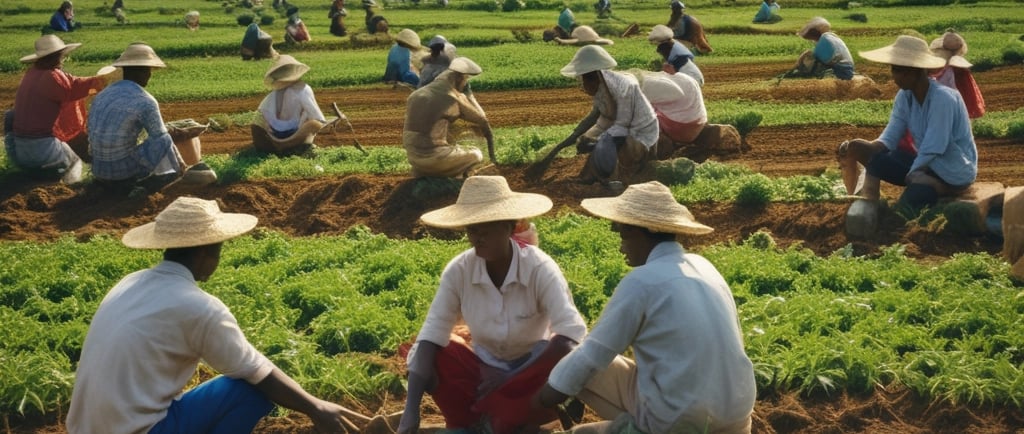Case Study Proposal: Smart Agricultural Cooperatives for Climate-Resilient Farming
BAIoT.org proposes smart agricultural cooperatives using Blockchain, AI, and IoT to empower smallholder farmers with data-driven tools for climate resilience, fair markets, and sustainable, community-led farming systems.
10/4/20254 min read


Case Study Proposal: Smart Agricultural Cooperatives for Climate-Resilient Farming
Empowering Farmers through Blockchain, AI, and IoT
Presented by BAIoT.org
Executive Summary
Agriculture is at the frontline of climate change. From unpredictable weather patterns and soil degradation to water scarcity and market volatility, farmers — especially smallholders — face mounting challenges that threaten food security and livelihoods. Traditional farming methods, while rooted in generations of experience, are increasingly insufficient to cope with the pace and complexity of these changes.
This case study proposal outlines a pilot initiative led by BAIoT.org to establish Smart Agricultural Cooperatives powered by the ethical convergence of Blockchain, Artificial Intelligence (AI), and the Internet of Things (IoT). The goal is to demonstrate how these technologies can be deployed in a community-driven, inclusive, and sustainable way to enhance climate resilience, optimize resource use, and improve market access for small-scale farmers.
1. The Challenge: Farming in a Changing Climate
Smallholder farmers produce over one-third of the world’s food, yet they are among the most vulnerable to climate disruption. Key challenges include:
Unpredictable weather: Droughts, floods, and shifting seasons make planning and planting increasingly difficult.
Soil degradation: Overuse, erosion, and lack of data-driven management reduce productivity.
Water scarcity: Inefficient irrigation and lack of monitoring lead to waste and crop failure.
Market instability: Farmers often lack access to fair pricing, reliable buyers, and transparent supply chains.
Limited access to technology: Most smallholders operate without digital tools, data, or connectivity.
These challenges are compounded by systemic issues such as fragmented cooperatives, lack of trust in intermediaries, and limited access to financial services.
2. The BAIoT.org Solution: Smart Agricultural Cooperatives
BAIoT.org proposes a pilot project in partnership with a regional farming cooperative in South Asia. The initiative will deploy a Smart Agricultural Cooperative Platform that integrates Blockchain, AI, and IoT to create a decentralized, intelligent, and transparent farming ecosystem.
2.1 IoT for Precision Agriculture
Soil sensors to monitor moisture, pH, and nutrient levels in real time.
Weather stations to track hyperlocal climate conditions and forecast anomalies.
Smart irrigation systems to automate water delivery based on crop needs and weather data.
Drone-based imaging to assess crop health, detect pests, and map field conditions.
These tools will provide farmers with actionable insights to improve yields, reduce waste, and adapt to changing conditions.
2.2 AI for Decision Support
Crop recommendation engines based on soil, weather, and market data.
Yield prediction models to help farmers plan harvests and manage risk.
Pest and disease detection using image recognition and pattern analysis.
Market analytics to identify demand trends and optimize pricing strategies.
AI will serve as a virtual agronomist, offering personalized guidance and predictive intelligence to each farmer.
2.3 Blockchain for Trust and Transparency
Digital land records and cooperative membership logs stored on a secure, immutable ledger.
Smart contracts to automate transactions between farmers, buyers, and service providers.
Traceability systems to track produce from farm to market, ensuring quality and origin.
Tokenized incentives for sustainable practices, such as water conservation or organic farming.
Blockchain will eliminate intermediaries, reduce fraud, and build trust across the agricultural value chain.
3. Expected Outcomes
The pilot aims to deliver measurable improvements in productivity, resilience, and equity:
3.1 Agricultural Productivity
Increased crop yields through data-driven farming.
Reduced input costs via optimized irrigation and fertilization.
Lower crop loss due to early detection of pests and diseases.
3.2 Climate Resilience
Improved adaptation to weather variability.
Enhanced soil and water management.
Reduced greenhouse gas emissions through efficient practices.
3.3 Economic Empowerment
Fairer pricing and direct market access.
Reduced dependency on middlemen.
Access to microloans and insurance via smart contracts.
3.4 Community Engagement
Strengthened cooperative governance through transparent records.
Shared learning and peer support via digital platforms.
Increased youth participation in tech-enabled agriculture.
4. Strategic Alignment with BAIoT.org’s Mission
This initiative reflects BAIoT.org’s commitment to ethical, inclusive, and impactful technology convergence:
Ethics: Data ownership remains with farmers; privacy and consent are prioritized.
Inclusion: Tools are designed for low-literacy users and available in local languages.
Impact: The focus is on real-world outcomes — better harvests, healthier soil, and stronger communities.
Collaboration: The project brings together technologists, agronomists, local leaders, and global partners.
5. Implementation Roadmap
Phase 1: Community Engagement and Planning
Identify pilot cooperative and conduct participatory needs assessment.
Map existing farming practices, infrastructure, and challenges.
Co-design the platform with farmers, ensuring cultural and contextual relevance.
Phase 2: Technology Deployment
Install IoT sensors and weather stations across selected farms.
Train farmers on using mobile apps and dashboards.
Develop AI models using local data and expert input.
Set up blockchain infrastructure and smart contract templates.
Phase 3: Testing and Optimization
Run pilot cycles for one growing season.
Monitor system performance and gather farmer feedback.
Refine algorithms, interfaces, and workflows based on real-world use.
Phase 4: Scaling and Integration
Expand to additional cooperatives and regions.
Integrate with government agricultural programs and extension services.
Develop open-source toolkits for replication and adaptation.
6. Risk Management and Mitigation
Technical Risks
Connectivity issues: Use offline-first apps and mesh networks.
Sensor failure: Implement redundancy and regular maintenance protocols.
AI model bias: Train models on diverse, localized datasets.
Social Risks
Resistance to change: Address through peer-led training and demonstration plots.
Data misuse concerns: Ensure transparent governance and farmer control over data.
Operational Risks
Seasonal variability: Pilot across multiple seasons to ensure robustness.
Funding gaps: Diversify support through grants, partnerships, and community contributions.
7. Broader Impact and Replicability
This pilot is designed to be scalable and adaptable across geographies. By using open-source technologies, modular architecture, and participatory design, BAIoT.org aims to create a replicable model for climate-smart agriculture.
Potential replication areas include:
Dryland farming regions in Africa and the Middle East.
Flood-prone zones in Southeast Asia and Latin America.
Post-conflict rural communities rebuilding food systems and livelihoods.
The initiative also contributes to global goals such as:
SDG 2: Zero Hunger
SDG 13: Climate Action
SDG 9: Industry, Innovation, and Infrastructure
8. Call to Action
Agriculture is not just about growing food — it’s about growing futures. Through the convergence of Blockchain, AI, and IoT, we have the opportunity to reimagine farming as a data-driven, community-led, and climate-resilient endeavor.
BAIoT.org invites partners from across sectors to join this transformative initiative. Whether you're a technologist, agronomist, policymaker, or funder, your support can help build a more equitable and sustainable food system.
Ways to Get Involved
Partner with us on pilot deployment, research, and policy advocacy.
Contribute to open-source development of agricultural AI and blockchain tools.
Sponsor farmer training programs and cooperative infrastructure.
Join our global community to share insights and co-create solutions.
Visit BAIoT.org to learn more, explore resources, and become part of the movement for ethical tech convergence.
Conclusion
This case study proposal is more than a technology project — it’s a vision for the future of farming. By empowering smallholder farmers with intelligent, secure, and inclusive tools, we can build agricultural systems that are not only productive but also just, resilient, and regenerative.
BAIoT.org is committed to making this vision a reality — and we invite you to be part of it.
Advocate
Pioneering the convergence of blockchain, AI, and IoT.
Connect
Support
Copyright © 2025 BAIoT.org. All rights reserved.
